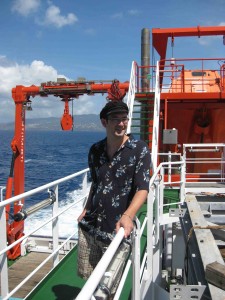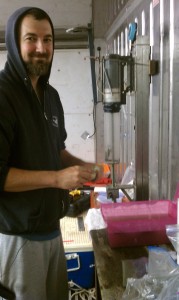Jesse Muratli
Jesse Muratli is curre ntly a Faculty Research Assistant at Oregon State University. He earned a Master’s from OSU studying how oxygen levels off of the coast of Chile changed throughout the past 30,000 years; he also reconstructed changes in continental weathering patterns affected by glacial retreat and changing atmospheric patterns in the region over the same time scale. He earned a bachelor’s in Environmental Studies from Lewis and Clark College. Jesse has participated in a number of research cruises collecting seawater and sediment samples.
ntly a Faculty Research Assistant at Oregon State University. He earned a Master’s from OSU studying how oxygen levels off of the coast of Chile changed throughout the past 30,000 years; he also reconstructed changes in continental weathering patterns affected by glacial retreat and changing atmospheric patterns in the region over the same time scale. He earned a bachelor’s in Environmental Studies from Lewis and Clark College. Jesse has participated in a number of research cruises collecting seawater and sediment samples.
Q: Have you always wanted to work in this field? Was there a defining moment in school or your childhood that guided you in this direction?
Honestly, working in this particular field has not been my childhood dream or anything like that. In my defense, I never really had a specific career that I was aiming for from day one.
Oceanography has always been in my life however, as when I was growing up my mom worked in the same lab that I do today. As my brother and I grew older she felt more comfortable leaving us with our dads and going on long cruises like the one we are going on soon, and I remember being jealous that she got to go to all sorts of places like Antarctica, Oman, the Seychelles, etc.
In high school I worked for the OSU Oceanography department (for Jim McManus even!) cleaning bottles, and I actually kind of enjoyed it. In spite of that it was never clear to me what I needed to do to become an oceanographer, although I was pretty sure I wanted a career in the sciences.
Q: What classes did you choose to take in HS? What were your majors in undergrad/grad school? Was there a favorite, least favorite?
The particular class that I took in high school that convinced me that science could be a fun occupation to have was called Field Biology. In this class we actually designed experiments to test out of doors, such as an insect specie s assemblage study across different micro-environments around the school. Once I realized science didn’t only take place in labs, I liked it a lot more.
s assemblage study across different micro-environments around the school. Once I realized science didn’t only take place in labs, I liked it a lot more.
As an undergraduate I majored in a non-science field, Environmental Studies, which was more of a cross-disciplinary degree ideal for someone working in a non-profit group or something like that. By the time I was finished with this degree I was pretty sure it was not what I wanted to do, which I somewhat regret.
There were a few classes I took during my undergraduate career that stood out to me. One was Ecology, where again we designed a study and went to a field site to test it. Another was called Environmental Physiology, which was a very rigorous science class for a Liberal Arts college. This was the first time I had to really hit a library and find a bunch of references (the internet wasn’t really available for this back then), then use them to write a scientific-style paper. I enjoyed this process very much. The last one was called Environmental Chemistry (there is a pattern to these course names) where, as a senior in college, I was first exposed to the science of global warming and the building blocks of paleoceanography, like oxygen isotope records through time. At this point I was convinced I wanted to study climate change in some way.
Q: What bit of advice can you offer to our future scientists and explorers following on this blog?
Remember that science should be fun. It’s not like the sort of job that you can go home and forget about at the end of the day, since one of the jobs of a scientist is to think and ponder. You have to work long and hard to get good data, but once you have it the answers are not always obvious. Therefore it is important to take time to relax. The relaxed brain may make connections that the overworked brain cannot, and like a Zen Buddhist meditating on a koan, the answers may come at unexpected times, even in a dream. When this happens you realize that your job is fantastic.
I would advise all future scientists, in any field, to have a decent knowledge of basic chemistry and physics. It is also important to have a good knowledge of statistics. What might be unexpected is the importance of knowing how to write well. A scientist needs to be able to communicate his or her findings and ideas effectively, so knowing how to write is not a trivial matter. This is something that takes a lot of practice, so I advise future scientists to do a lot of writing and to get feedback on that writing from teachers or professors.


Recent Comments